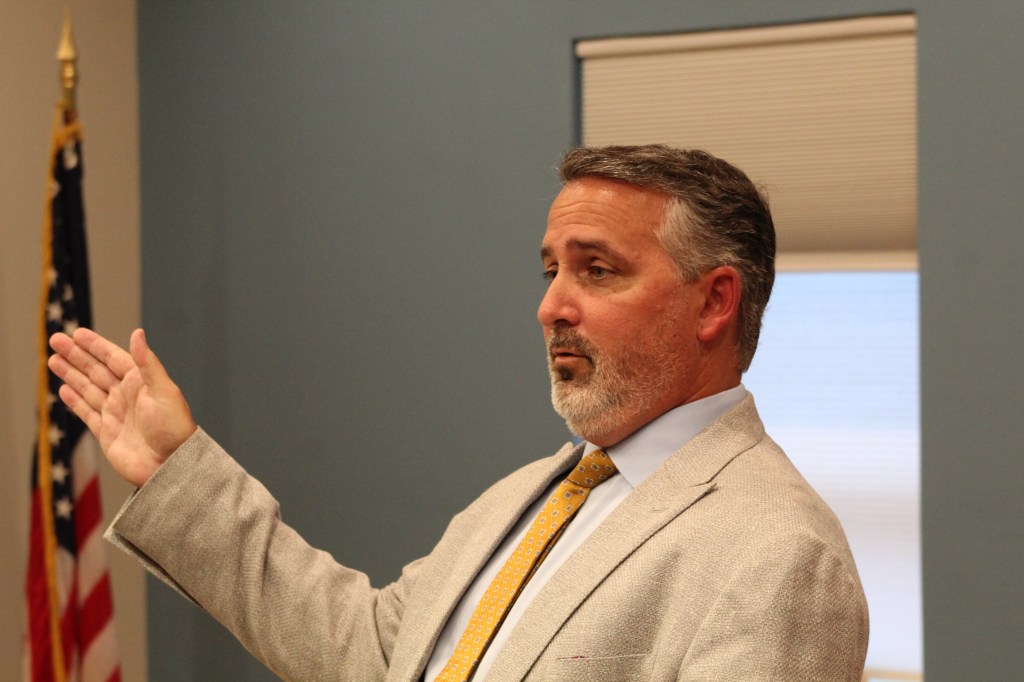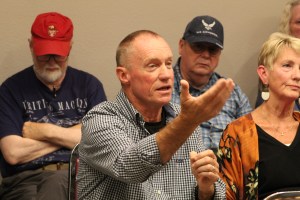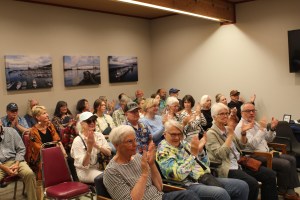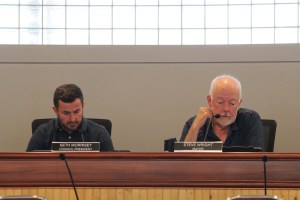Community turns out for Rep. Javadi’s town hall
Published 9:51 am Monday, August 4, 2025

- Javadi gestures while speaking to constituents Tuesday. Mathias Lehman-Winters.
About 45 community members packed into a crowded Port of Astoria commission meeting room Thursday evening to attend a town hall hosted by Republican Oregon State Representative Cyrus Javadi. Hardly a chair in the room was left vacant, and some attendees overflowed into the hallway.
Throughout the nearly 2-hour long session, the lively crowd listened intently. At times becoming contentious as attendees called out, demanding that fellow attendees identify their party affiliation.
Javadi, who represents Tillamook and Clatsop counties as well as Clatskanie, organized the town hall to discuss with constituents the outcomes of the 2025 Legislative Session and take questions from the community.
Trending
Session overview
Javadi began by walking constituents through some of the most pressing issues facing House District 32 and the state.
Javadi said over the last 22 years, the current structure of the state’s Transient Lodging Tax has worked well and helped create a tourism industry, but “what hasn’t kept up is the quality of the sewer infrastructure, the roads, the law enforcement.”
He said changes in House Bill 3962, a bill that failed to pass the legislature, would have given communities more flexibility over how cities spend TLT money. He also said the bill will return in the 2026 short legislative session, and he expects it to pass.
“Our cities and communities will begin to see some of the funds that they need from that.”
Javadi celebrated state investments in local projects such as the $6 million in funding for the Columbia Memorial Hospital expansion and $700,000 for renovations to the Maritime Museum.
Trending
He also discussed the events surrounding the failed transportation package, HB 2025, which left the Oregon Department of Transportation facing mass layoffs.
Javadi said the bill would have imposed at least a 10-cent tax on gas with additional fees on vehicles. He expressed concern the additional revenue from the bill would not be properly managed.
“What was missing from the bill was some serious accountability metrics and measures, things that made sure we wouldn’t find ourselves in the same situation again.”
Javadi said he has heard rumors the new transportation package in the Aug. 29 Special Legislative Session, called by Governor Tina Kotek, will include a 6-cent gas tax increase at the pump, in addition to new DMV fees, electric vehicle fees, and an increase in the payroll tax.
“We should know for sure in the next few weeks,” Javadi said.
Healthcare and Medicaid
The first half of the town hall was dominated by questions surrounding the Columbia Memorial Hospital’s $300 million renovation and expansion project.
One constituent asked: “Can you explain what the expansion of the hospital (Columbia Memorial Hospital) is going to include? How many beds are there going to be?”
Javadi said CMH can’t go beyond 25 beds, “because the minute they do, it changes their whole funding picture, how they’re reimbursed by insurance, Medicare, Medicaid, and so they need to stay under that limit.” He said the hospital is also undergoing renovations that will expand its resilience. “If we have a Cascadia event, this will be the trauma center.”
Javadi said in a Cascadia earthquake event, the low-lying areas in Astoria between the hills and the river will be inundated with water. “The (top level of the) hospital will be the place people go to, up to 250 people will be able to be kept warm, dry, and fed.”
In response to another question on the CMH expansion, Javadi said the community is investing in generations of treatment for Clatsop County. “Right now, if there is an event (Cascadia), and we expect there will be an event … it will destroy the hospital we have here (now).
“It will knock the bridges out and make it impossible to get to Seaside, if Seaside is even still standing … . What our team at the hospital did was (ask) how do we make sure that CMH is still here, and how do we make sure that we’ll be able to provide care and access when we most need it.”
People then asked about what federal cuts to Medicaid could mean for the community — and also brought up the notion of people living in the community illegally.
“So we have a lot of people here on Medicaid,” one person said, “how many of them are here illegally? What percent?”
Javadi said he did not know how many people were living in the community — or in Oregon — illegally.
The constituent asked a follow-up question, “Are we going to pick and choose what laws we follow? It seems like that’s what this sanctuary city thing is doing — it’s a way of harboring fugitives.”
Javadi took the question in stride. “We don’t pick and choose the laws we obey, but the states have a lot of flexibility on how they want to spend their money,” he said. “When you look at the pot of money that goes into the Medicaid bucket, billions come from the state. And billions and billions more come from the feds. The money that comes from the feds has strings attached. We can’t spend that money in any other way than the feds say, and the feds have said you cannot spend this money on illegal immigrants; that portion of the bucket can’t go towards that.”
However, Javadi said in Oregon, the state gives immigrants access to Medicaid.
“The state has said, ‘We want to spend some of our money on providing healthcare for illegal immigrants who are in our communities, in our farms, in our business, we want to make sure they are healthy enough to go to work, and for their children to go to school,’” said Javadi.
Another town hall attendee asked what was the legislature doing to help insulate the state from impending Medicaid cuts.
“What we wanted to do was make sure that things like the provider tax stayed in place. It was set to expire, and if it had expired, it would have cut money further,” Javadi said. “Things like the 340B program … which is that if you’re a hospital like the one we have here in Astoria, you qualify for special discount pricing on your drugs, because you serve a disproportionately large share of Oregonians that can’t afford healthcare. Those discounts made it so that the hospitals could stay afloat; that program was in danger of going away this year as well.”

Republican constituent asks question during the town hall.
Javadi said, in short, the legislature prevented the “legs of the state’s healthcare system” from being knocked out from under it, but they could not control the cuts going on at the federal level.
He said when the cuts take effect in 2027, the state will likely have to cut people from Medicaid.
“What’s likely on the table is cutting Medicaid for adults. Cutting Medicaid benefits for illegal immigrants … the easiest thing that the Oregon Health Authority could do would be to say: ‘Well, we spend this many billions on healthcare, we’re going to cut it back to emergency care and make sure that kids have as robust of a Medicare program we can get.’”
Javadi said the legislature could try to “finagle money” around in the budget and shift it toward funding Medicaid, but it would likely have to take money from housing initiatives.
“There are not unlimited amounts of money, which means either tax increases, reallocation, or cutting services.”
Education and schools
In response to a question on the state of public education in Oregon, Javadi said while the state has wonderful teachers, “students are not even performing close to the benchmarks where they need to be.
“We went away from basic standards … I think the heart and the intent were in the right place, but we have to face the facts and look where the metrics are, and we’re not the first.”
Javadi said he would like to see the legislature focus more on improving core skills such as math and English. He also said the school’s superintendents are trying their best, but the legislature is not providing them with enough financial support. In part, Javadi said this stems from limitations on tree harvesting, particularly in Clatsop and Tillamook counties, which are restricting a potential revenue stream for public education.
“Interestingly, we are spending more per pupil than most other states by a huge margin,” Javadi said. “So we’re spending money like we’re buying a Ferrari, but we’re actually getting the 30-year-old Volkswagen that my daughter just found out today is not going to survive another week. So we need to make those things match up.”
Someone questioned Javadi on why he voted to allow “pornographic material” in schools.
Senate Bill 1098, which Javadi voted for, prevents the removal of books from school libraries based on content related to protected classes such as different religions, sexualities and disabilities.
Javadi said he did not believe there is a systemic issue involving pornography in books.
“There are different stories that are being told that are not pornographic, and people have objections to these stories simply because of who the story is centered on. Whether it’s someone who is Islamic or Black, or a member of the LGBTQ community … . There is no reason why a kid who wants to learn more about who he is or who she is can’t go to the library and find a book or a story that reflects that,” Javadi said. “And that doesn’t mean just because you’re LGBTQ that you’re only interested in pornography. I support the idea that kids should have access to books about ideas that reflect who they are, not pornographic material.”
The constituent pressed Javadi. “We don’t need to have those books that you’re describing in our schools.”
Javadi responded. “I think you would agree with me that the government shouldn’t be dictating what books our kids have access to.”
At this, the room burst into applause.
Shortly after, Javadi concluded the town hall and thanked those in attendance for their questions, as well as for bearing the heat that comes with a crowded room during a summer evening. He invited those who still had questions to stay and discuss with him further.

Constituents applaud at conclusion of town hall.
Community reactions
After the town hall, Gearhart resident Vivian Battjes said she thought the event went well but wished more could have heard what Javadi had to say.
“I wonder whether he has more Democrats supporting him than Republicans,” Battjes said. “I appreciated that he took questions from everybody, and I thought he handled himself well. As a conservative Republican, I’m not sure I will vote for him again.”
Laurie Caplan, a Democrat, said she was glad she came to the town hall.
“I thought it was wonderful that so many people came from diverse backgrounds and political beliefs. I thought he stayed with his values and his principles really well, even when there were people loudly interrupting,” Caplan said. “I thought it was great that people wanted to come and that he was willing and wanting to engage.”
Astoria City Councilor Elisabeth Adams said she appreciated how Javadi discussed issues that were important to the city, such as the TLT and the CMH expansion.
“I think that Cyrus was able to speak non-partisan, which was really important given the way our district is made up,” Adams said. “I loved hearing that he is still representing and supporting the diversity that Oregon is, and allowing for different voices to be heard — even if he doesn’t agree with them.”









